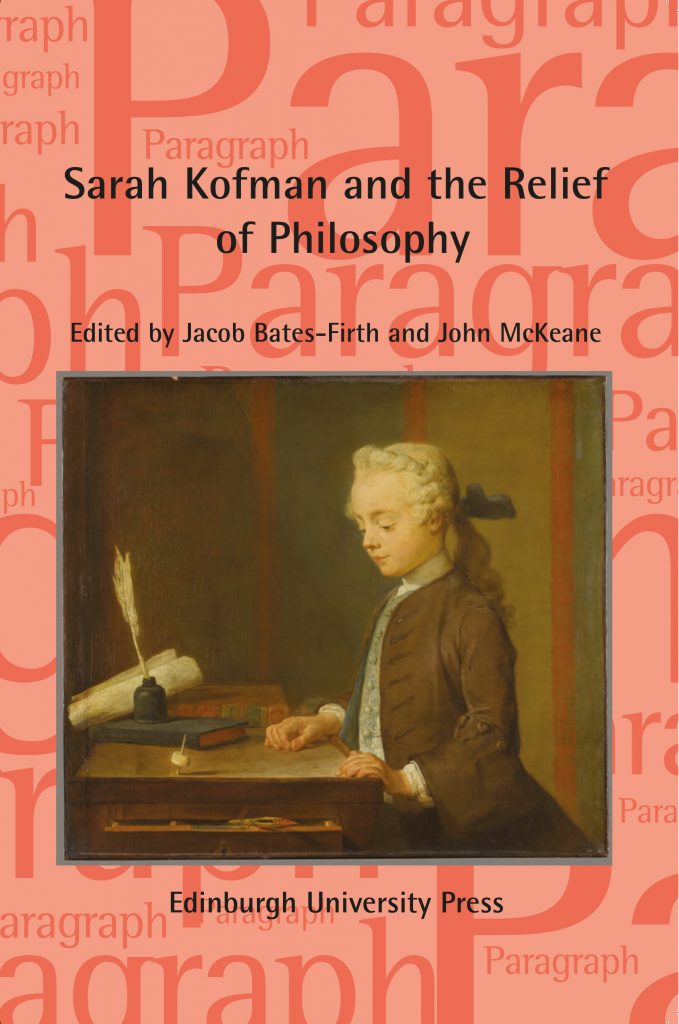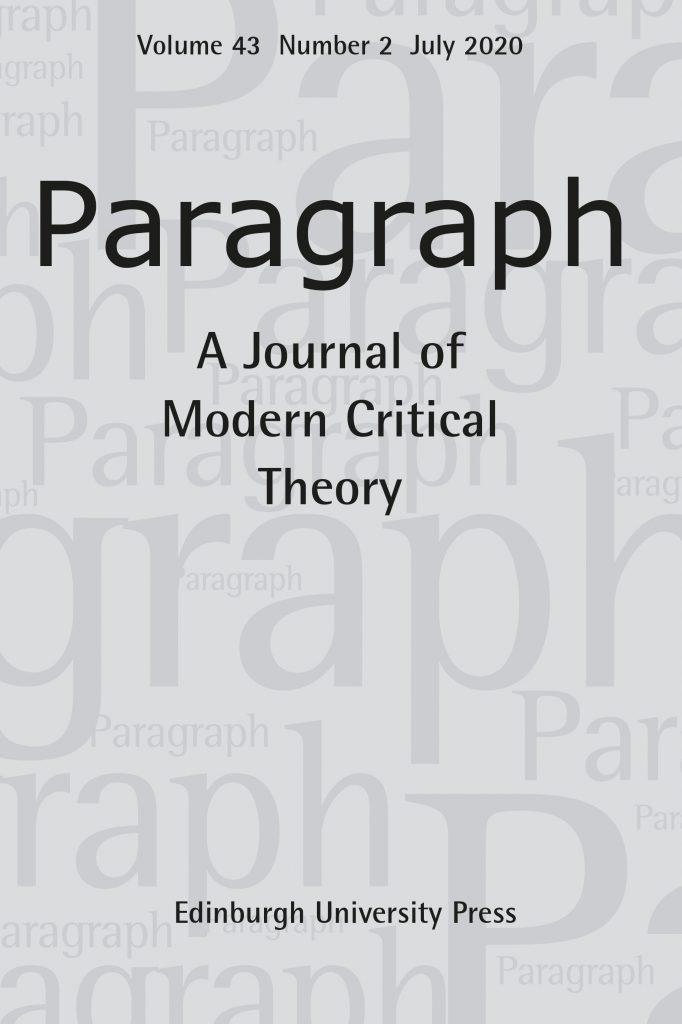
By Jacob Bates-Firth
Sarah Kofman and the Relief of Philosophy (ed. Bates-Firth and McKeane) is out now as a special issue of Paragraph, 44:1 (March 2021) and concurrently in book form with Edinburgh University Press.

Backdrop
When John and I began to plan the conference whose proceedings eventually came to form the basis of this book, there was a sense of a double bind presiding over some of the decisions we were due to make. On the one hand, since the conference was in part a way of marking 25 years since Sarah Kofman’s sudden death in 1994 and commemorating her life and work, we felt a duty to maintain more strongly than usual an ‘academic’ neutrality as organisers so as to open up a space for reflection and remembrance not overly pre-invested with our own interests. On the other hand, since the conference was the first Anglophone event on Kofman in some time (and potentially the sole for some time to come!), we wanted to aim at contributing as best possible to what might be termed the ‘survivance’ of her thought. To its living on in the sense of its development or its waxing.
This led us to give to the conference the title: Will to Truth: Sarah Kofman and the Relief of Philosophy, and to so tilt matters towards ‘Sarah Kofman the philosopher’. Towards the author who presents, among other things, many interpretations of well-known figures from the history of ideas emphasizing the role played by their instinctual lives and biographies in the constitution of those ideas, yet who also states that ‘the destiny of thought is, obviously, irreducible to the destiny of the drives’ (1).
Kofman?
Today, Kofman seems to be less well-known than many of her immediate peers and contemporaries in the French intellectual scenes of the 70s, 80s and 90s. In the context of the Philosophie en effet group for instance, amidst which Kofman worked for two decades alongside Jacques Derrida, Jean-Luc Nancy and Philippe Lacoue-Labarthe, she vies with the latter for the position of least canonised. Misogyny very likely plays its part here. Nonetheless, a similar discrepancy is identifiable if we compare the influence of Kofman’s thought with that of the highly celebrated ‘French feminist theorists’ who came to prominence at roundabout the same time and with whom Kofman shared many interests and concerns: Hélène Cixous, Luce Irigaray or Julia Kristeva, for example.
Why this relative lack of interest? In addition to Kofman’s insistence on her intellectual independence and corollary hostility towards the ideological, philosophical and psychoanalytic authorities which might have supported her legacy, it is worth recalling her idiosyncratic method in this context. Kofman developed a writerly practice which entailed dissimulating the forcefulness (and even the pugnacity) of her thought behind a surface of close textual analysis, largely dispensing with positive counter-argumentation in order to present herself as reading, repeating and subtly ventriloquising the read object. The direction of her thought, thus elaborated within what can appear at first glance to be slavish submission to an other’s discourse, is as a consequence less legible to those unwilling to lend an interpretive ‘third ear’ to her texts or to accept mediation and perspectivism as philosophical principles.
The intensity of Kofman’s emphasis on this practice of reading, which intersects with her broader, anti-Aristotelian rerouting of the classical opposition of identity and difference and with her scorn for the so-called metaphysics of the subject, leaves her readership circumscribed in a particular manner. It seems safe to say that a non-systematic philosophy which for the great part forgoes declarations and exhibits itself through the deconstructive repetition of forerunners does not aspire to universal appeal. The culmination of certain aspects of this practice in Kofman’s suicide is probably also not negligible here. Kofman died by her own hand on the 150th anniversary of the birth of Nietzsche, seemingly affirming through this discomforting ‘gift’ her simultaneous nearness to and alienation from an author who she avowed herself to be ‘madly in love with’ (2).
‘Living On’ Today
More plainly, Kofman’s early death also means that she spent several decades fewer extending her thought and consolidating legacy relative to many of her contemporaries. There is perhaps a risk of overstating the case that she has been forgotten and so giving free rein to a wish to make Kofman into a ‘victim of history’ in need of the reparative labour of later scholars.
Whatever the case may be, we can happily say that Sarah Kofman and the Relief of Philosophy is the third Anglophone book exclusively focussed on assessing her thought, it having been some 13 years since the publication of Sarah Kofman’s Corpus, edited by Tina Chanter and the late Pleshette DeArmitt, and 22 years since Enigmas: Essays on Sarah Kofman, edited by Penelope Deutscher and Kelly Oliver. As I count it, this is the eighth of such books in all languages, with another collection of essays edited by Isabelle Ullern and Ginette Michaud due shortly (3). I hope very much that the book will be a spur to further work on Kofman. It contains many lucid and original essays on underexplored and often untranslated texts, along with a translation of Kofman’s final essay on Nietzsche.
As we enter into a difficult decade at the outset of what seems likely to be a trying century, to say the very least, it is perhaps valuable to consider the relevance(s) that the remembrance, misremembrance or non-remembrance of this apparently marginal 20th century philosopher’s thought might hold for us today.
In the immediate British context, Kofman’s extensive studies on the psychological significance of sexual difference in the history of philosophy come to mind, which implicitly suggest a common, idealistic root to certain forms of misogyny (as the restriction of women to repeating the characteristics and traits of a prescribed sexual model) and certain forms of transphobia (as reaction-formations against the psychological discomfort caused by seeing the stability of such models give way). Might these analyses not provide a useful pathway towards dialogue, if such a thing is possible, between the trans-affirmative and the trans-exclusionary?
Speaking to the century more broadly, it is impossible not to recall Kofman’s direct experience of disaster and the difficult manner in which this experience is integrated into her fiercely affirmative, generative philosophy. It would be dangerous to say that the extremity of the suffering faced by Kofman as a Jewish Parisian child in the 1930s and 40s was in any way instructive. Nonetheless, on account of this, Kofman’s thought is suffused with reflections on the difficult task of learning to think with pain and with what she sometimes calls ‘the intolerable’: not in order to soporifically avoid them or to bury one’s head in the sand (or in philosophy and its speculative mirrors), but in order to say ‘yes’ to them, to recall them and to retain the capacity to act with regard to them. In this respect, Kofman steered an alternative course which rejects the compensations of both optimism, with all its evasiveness, and pessimism, with its nihilistic refusal to value life or to contribute to its flourishing. Is there not a value to this double rejection in the face of climate breakdown and the (much repudiated) moral onus to mitigate the further ecological damage and socio-economic hardships it seems sure to bring?
(1) Sarah Kofman, ‘La question des femmes : une impasse pour les philosophes’ (Interview conducted by Joke Hermsem), in Les Cahiers du GRIF, no. 46, 1992, p. 65-74, 65.
(2) Françoise Collin, ‘L’Impossible diététique : philosophie et récit’, in Les Cahiers du GRIF no. 3 (special issue: Sarah Kofman), 1997, p. 11-27, 16.
(3) Sarah Kofman : philosopher autrement, ed. Ullern and Michaud (Paris: Hermann, forthcoming).
Paragraph is a leading journal in modern critical theory, exploring critical theory in general and its application to literature, other arts, including film and visual culture, and society. Regular special issues by esteemed guest editors highlight important themes and figures in modern critical theory, such as Bourdieu, queer theory, religion and film, André Bazin, Francophone communities and more. Find out how to subscribe as an individual, or recommend to your library.







